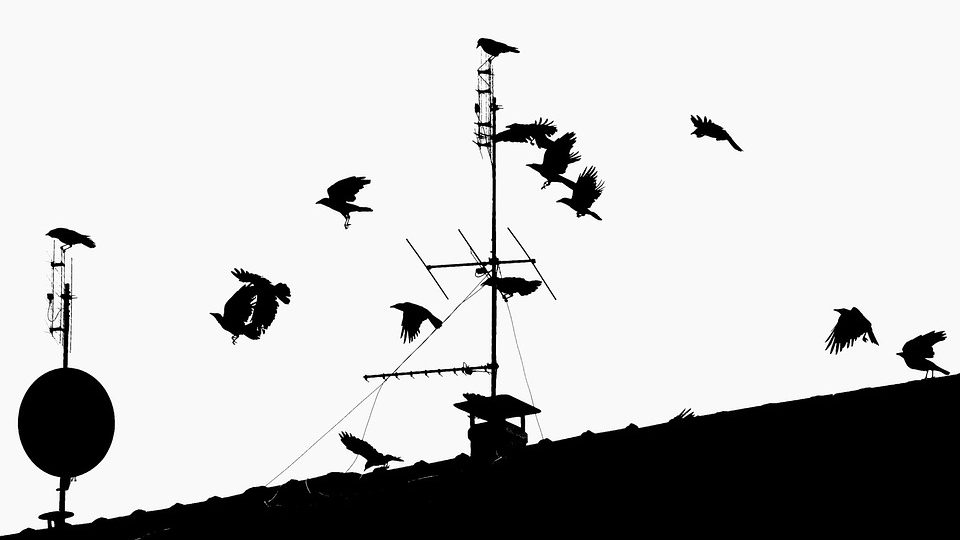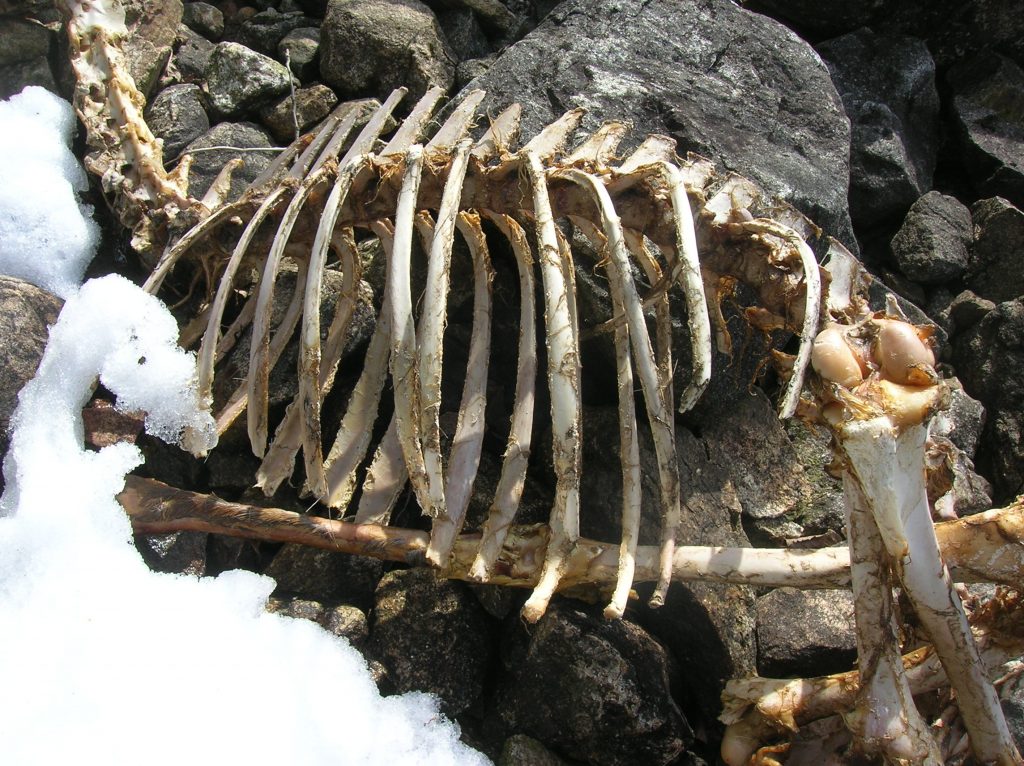20 years ago MQR published the first of two special issues on the Secret Spaces of Childhood. The following poem, from Thylias Moss, is available via our archives.
The Generosity of Arpeggios and Ravens
Please note: The following is an arpeggio. It was possible to leap from world to world using the sturdiest balloons I'd ever seen. They didn't move despite what should have been the effect of so much unified breathing; they didn't move, but they moved the congregation to song. Such worlds. Such balloons. They had short black tails and were solid black themselves, resting on parallel thin black lines of number seventeen, "How Great Thou Art," some of them arpeggios for the right hand of the organist alone. And in each world, I was there, a guest inside the notes, one of which was High-C# in which a cathedral was guest also—I sensed its height, breadth, and depth even though it was pitch black, all the atmosphere, all estimates, every window pitch black, and there were thousands of windows on both sides of which a thousand birds sang all the dark day, there was only day, and I was never able to touch the ceiling of the cathedral, and the cathedral never touched the ceiling of the note, and the note never reached its own ceiling, for it was a sound reverberating blackly, for everything there was black and in that unity, endless also. Endless unseen dark presences felt. The note echoed only because there were ceilings and walls around which the sound bounced all the dark day, syncopating the choruses of birds whose wings may have been the ceilings and walls. O blessed density and magnitude of cooperation. This was the generosity of arpeggios and ravens. This for a six-year-old who otherwise had to contend with monstrosity. I enjoyed the volleying of praises in High-C#, a world every hymn didn't contain, a world I didn't want every hymn to contain, so when there, it was an occasion. The exceptional easily persuaded me, even exceptional cruelty when I found it while in the care of a young sadist who tended a fecund garden of despair; how she hurt with bruises and the possibility of knives the outside of the edifice, the only part of me that she knew existed, the part that became the least of me as the most explored the geographies of Elsewhere, some of which existed in pages, the sound of them turning in the library (that was to me a convent for books) such a relaxed unrushed motor it could not have existed on Lytta's earth. When I riffled pages to allow books to breathe, sometimes words and parts of words flew out, High-C#s of alphabet. There was and there remains Lytta's influence, active (though not controlling) in what I've chosen so far to say, but despite the fuller effect of her when she was a literal operative most weekdays, I built cathedrals, perhaps unlit, perhaps the usual incandescence bypassed because of her (for she was limited to obvious arenas), but cathedrals they indeed were—of arpeggios and ravens she has never seen. Such materials. There was a time that I hoped the stained glass of the Masonic Temple was really just windows cut from massive blocks of obsidian or agate—for nature delights in manufacturing extraordinary blemish, magnificent defect. Beauty most unbearable must be unplanned, unrehearsed; nothing could bear its schemed production. So cut thin, no—thinner obsidian and agate slices reminiscent of a time of rationing or a time of disdain for excess. This world may not abide this presence always. So cut them so thin the windows are always on the verge of breaking. And every moment that they don't break is to be understood as miracle. Why not? I lived and hoped in such a world in which my only assigned role was architect. The world that contained this obsidian world was one where others could and did act against me, but the High-C# world of obsidian windows was known to no one other than me. Nothing in the worlds of notes spoke, but sometimes the birds on either side of the obsidian windows were vaulting and flying words, and I plucked some of their feathers for poems, even wrote some of the poems with some of the plucked feathers. Nothing inhabiting the worlds could speak to betray the worlds—how great are those strung-up worlds to be so closed to violation; how impossible to get by the treble and bass clef gates except as hymn. Don't ask me what the preacher was saying in the world I left behind. In church I listened most closely to the prayers, the richest ones in baritone and alto, but somewhere in all of them, even in Sis. Ester's over-stretched soprano in which some noted syllables were so high, no one could hear them; even in the soundless fractures of her prayers at altar call were requests that followed gratitude, favors that only had to be asked for to have them granted. I never tried the beseeching, did not want to ask for things because I had them all, tyranny in a baby-sitter and delight in the world my parents made, the world in which I provided all the gravity, all the radiance. They elevated me in ways that most children of my generation (perhaps of any generation) were not. They both solicited and followed my advice, and lived with me in a world within another, a world only we could enter, only we could locate. The geography of that world's stunning splendor I laid out in a recent memoir, so will leave the details to those pages, but with or without the details, it was paradise that saved me, the one I knew was real, our part of the duplex that Lytta's family owned. My address was sanctuary. Sanctuary was arpeggio. Our part of the duplex was one of the arpeggio's notes—and so was my mind—and so was the library—and so was Louis Pasteur elementary school—and so was the lined paper on which I wrote so many arpeggios of words. But to access those places it was necessary to navigate the tyranny, to see and try to comprehend the unbearable beauty of a world in which I saw how few were exempt from the tyranny, not the boy killed on his bike when I watched a truck hit him in the street between the library and a hospital; not the boy whose death came slowly after nails were hammered into his head by boys whom I liked to think didn't know the hammered one was in the box that was their trampoline, but I knew, from a few feet away in the sanctity (in the world) of a thorny bush that produced inedible berries, that the box was occupied, that for some it was an emergency toilet, and that for all who used it, it was some sort of convenience; and not the girl who learned to fly in every world except the one in which she jumped from a balcony fleeing either a rapist or a burning building—sometimes I confuse the worlds, especially worlds visited just once, for in no other did a girl jump from a balcony, and in no other did I fail to catch something falling toward me. There was no light in the hallway leading to downstairs and Lytta's kitchen door, so the hallway became a tunnel dug only halfway to China and the paradise on the other side of the world. Halfway was the basement where the furnace stood rigid as a tree, its pipes and ducts metallic branches suffering an enchantment with the Tinman. The last steel tree of his forest. The coolness down there fascinated me, the constant coolness despite the source of the house's heat. As if the sun would not have to burn me if, grateful, I approached it. Also the basement was retreat when thunderstorms exercised their necessary rages during which some spawned tornadoes to put icing on what the thunderstorm's gale force winds had already stirred up. Cool and dull-dark, not the perfect darkness of the arpeggio's cathedral. The underground was gray, outlines remained apparent in the basement's always twilight; even after midnight twilight was maintained by the light of a street lamp whose yellowish glow filtered muted through the window from which the Contact paper was peeling, and from which the paint under the Contact paper had been scraped. My birthday parties were celebrated down there as well, the candles on every cake (usually three cakes) providing the only light, and it seemed that Roman candles sparked every February. But this region was also Lytta's, and to claim it she marked it with violations of my body, her cousin's body, and my life-size doll that actually felt the knife. I felt flesh, every form of its weakness; the cousin felt both a heated soleplate and my five nails that were trying not to draw a music staff on a fresh Indianapolis cheek, but what dark chalk can exert its will even if it has will? Lytta was composing on a cousin, manipulating five pens at once, and I was placing arpeggios on the bleeding staff under my obedient five fingers. Arpeggios of cathedrals. Cathedrals of obsidian feathers and beaks. Read my stories from when I was six, seven, eight; read of events all of which are impossible in this world, but that in my architecture of words still stand unchanged. The house Lytta built is gone. She did not exist in a single arpeggio, and when I was singing I couldn't pronounce her name; it wasn't part of the language of song. Thoroughly untranslatable despite an ascending sonic beauty if the name names someone, something else. Only in a few things did I want permanence, consistency, predictability; mine was seldom a yearning for universals. I wanted worlds ever confounding to prophets and fortune-tellers; so many worlds within worlds, prophets and fortune-tellers had no way of knowing how many, no hope of visiting them all, for hope was denied prophets and fortune-tellers whose gift instead was foreknowing. I could look, you must understand, into things and know something, such as into my hand where I could see how narrow the roads of escape were (one needed to be as small as I was to navigate them) and how they led to falling off the edge of a flat palm; all worlds weren't round. Long ago, scholars, theologians, and cartographers weren't aware (after finally lifting roundness from heresy) that they had merely misidentified which world was the flat world. I could look into my father's morning coffee and in the way the cream swirled into it see promises practically disappear; all that persisted was their influence, their ability to lighten the burden of being unadulterated, being pure and certain. It was influence that made the difference, influence such as how slush and dirty sidewalk pools of rain shined my father's shoes so that by the time he walked from the bus stop to home, his feet arrived in gleaming Stacy Adams vehicles; his wet tracks glowed on the pavement, on the kitchen's linoleum, the braided rug. O that we hadn't cleaned away the shine, my mother and I; O that we hadn't stripped the floor of a kind of flat crown blessed by the soles of his feet. So dusty now are the shoes, and so narrow that only one person in the family has any hope of ever wearing those shoes (my feet are narrow enough, not long enough), but he is too small at the moment, and who knows all that can stunt growth? There are cracks in the shoes that are right now in my mother's attic in their original box, cracks across the vamps and across the perforated toe caps so that the shoes have taken on the design of his hands, his hands I know because our hands gripped identical maps, heralding from the same place, heading to the same places not mapped on any other map; and the tongues of the shoes are patterned also, like, well, tongues, but none of his survivors (none of whom are fortune-tellers) know whose taste is being modeled. Of course, there's more about obsidian, but only this bit of the more must be said: We walked, my father and I, from world to world, and in one of them I found a piece of obsidian, smoky toned; held up and looked through in light, it still suggests a dark, rudimentary amber and prompts a search for insects, preferably at least one with outspread wings so thin it's necessary to believe that the wings are made of old honey, first honey. What beautiful windows could be cut from it, miniature windows of outspread wings whose designs, whose lines that hold the honey seem nets, honey traps; it should be wings that eventually ensnare me. The obsidian sits on my desk. My sons thought I had a piece of glass bottle, maybe I do; maybe it's a shank of one of my father's Mr. Boston bottles; maybe it's a piece of what I could find after the neighborhood declined and something volcanic seemed to have happened; lots of glass, obsidian scattered like heavy persistent rain, but what windows I still see in it and through it because I opened such windows when I was six—and didn't close them. There was no secret; the cathedral was too vast, the arpeggio too resonant. There was just the need to use my other eyes, the eyes I designed to see it. I think of these eyes—there are as many pairs of eyes as there are arpeggios—as somewhat like masses of roe, glistening, so delicious after one has a taste for it, a reason for it, an appropriate occasion. One appropriate day, the cathedral took the form of a man. Everything he said was arpeggio. Everything he did was raven. I married him in every world.



